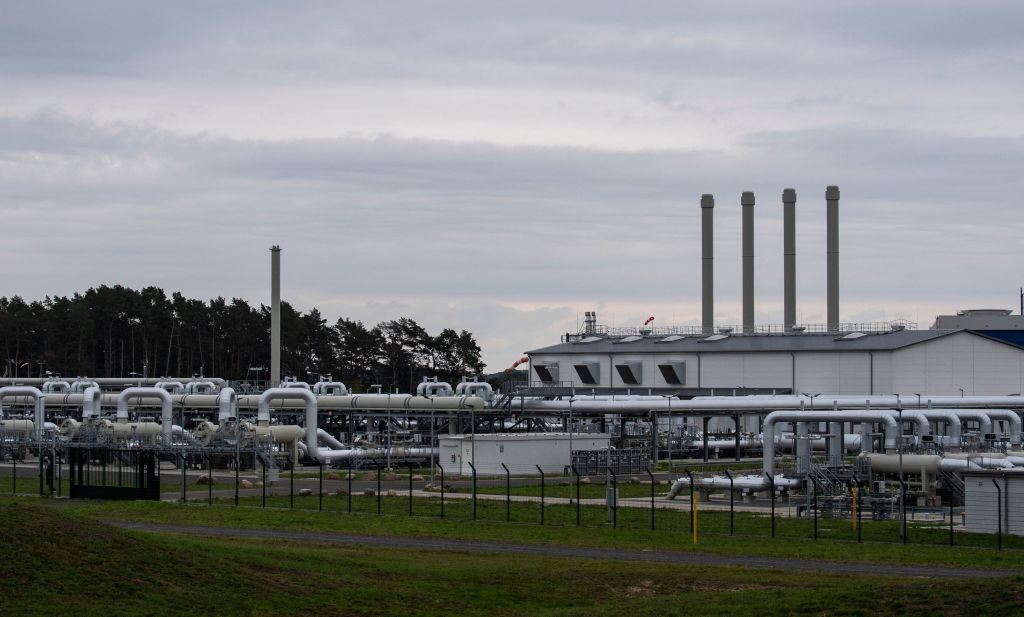U.S. working to cut NATO Europe's reliance on Russian oil and gas


A free daily email with the biggest news stories of the day – and the best features from TheWeek.com
You are now subscribed
Your newsletter sign-up was successful
The Biden administration announced Tuesday that it is working with international partners to ensure NATO allies in Europe would not be crippled if Russia cut off natural gas shipments, The New York Times reported.
According to the Times, the U.S. is working with "gas and crude oil suppliers from the Middle East, North Africa, and Asia," but the unnamed administration official who shared this information was unable to provide the names of specific countries.
The European Union, which consists mostly of NATO member states, gets about one-third of its natural gas and crude oil imports from Russia.
The Week
Escape your echo chamber. Get the facts behind the news, plus analysis from multiple perspectives.

Sign up for The Week's Free Newsletters
From our morning news briefing to a weekly Good News Newsletter, get the best of The Week delivered directly to your inbox.
From our morning news briefing to a weekly Good News Newsletter, get the best of The Week delivered directly to your inbox.
In 2019, petroleum products and natural gas combined accounted for over 58 percent of the EU's energy use, according to EU data.
Fossil fuels account for over half of Russian exports, and four of the five largest importers of Russian exports are NATO members.
A shutoff would also harm Russia. According to a Russian study cited by one oil industry publication, oil and gas made up 15 percent of the Russian economy in 2020.
The administration official said any Russian attempt to withhold energy from Europe "wouldn't be without consequences to the Russian economy" because Russia "needs oil and gas revenues at least as much as Europe needs its energy supply."
A free daily email with the biggest news stories of the day – and the best features from TheWeek.com
With U.S. help to — as the unnamed official put it — "ensure alternative supplies covering a significant majority of the potential shortfall," European NATO members could be confident that they would emerge victorious from an energy standoff with Russia.
That confidence, the Biden administration hopes, will embolden those allies to impose and stick to tough sanctions against Russia in the event of an invasion of Ukraine.
Grayson Quay was the weekend editor at TheWeek.com. His writing has also been published in National Review, the Pittsburgh Post-Gazette, Modern Age, The American Conservative, The Spectator World, and other outlets. Grayson earned his M.A. from Georgetown University in 2019.
-
 Quiz of The Week: 14 – 20 February
Quiz of The Week: 14 – 20 FebruaryQuiz Have you been paying attention to The Week’s news?
-
 The Week Unwrapped: Do the Freemasons have too much sway in the police force?
The Week Unwrapped: Do the Freemasons have too much sway in the police force?Podcast Plus, what does the growing popularity of prediction markets mean for the future? And why are UK film and TV workers struggling?
-
 Properties of the week: pretty thatched cottages
Properties of the week: pretty thatched cottagesThe Week Recommends Featuring homes in West Sussex, Dorset and Suffolk
-
 Ex-South Korean leader gets life sentence for insurrection
Ex-South Korean leader gets life sentence for insurrectionSpeed Read South Korean President Yoon Suk Yeol was sentenced to life in prison over his declaration of martial law in 2024
-
 Putin’s shadow war
Putin’s shadow warFeature The Kremlin is waging a campaign of sabotage and subversion against Ukraine’s allies in the West
-
 Rubio boosts Orbán ahead of Hungary election
Rubio boosts Orbán ahead of Hungary electionSpeed Read Far-right nationalist Prime Minister Viktor Orbán is facing a tough re-election fight after many years in power
-
 Key Bangladesh election returns old guard to power
Key Bangladesh election returns old guard to powerSpeed Read The Bangladesh Nationalist Party claimed a decisive victory
-
 Epstein files topple law CEO, roil UK government
Epstein files topple law CEO, roil UK governmentSpeed Read Peter Mandelson, Britain’s former ambassador to the US, is caught up in the scandal
-
 Iran and US prepare to meet after skirmishes
Iran and US prepare to meet after skirmishesSpeed Read The incident comes amid heightened tensions in the Middle East
-
 EU and India clinch trade pact amid US tariff war
EU and India clinch trade pact amid US tariff warSpeed Read The agreement will slash tariffs on most goods over the next decade
-
 Israel retrieves final hostage’s body from Gaza
Israel retrieves final hostage’s body from GazaSpeed Read The 24-year-old police officer was killed during the initial Hamas attack
